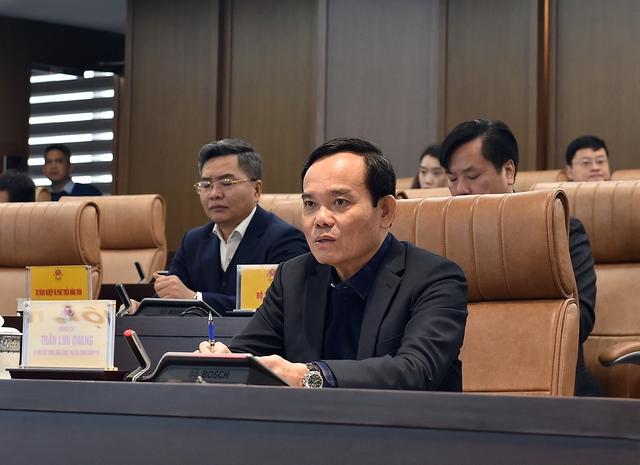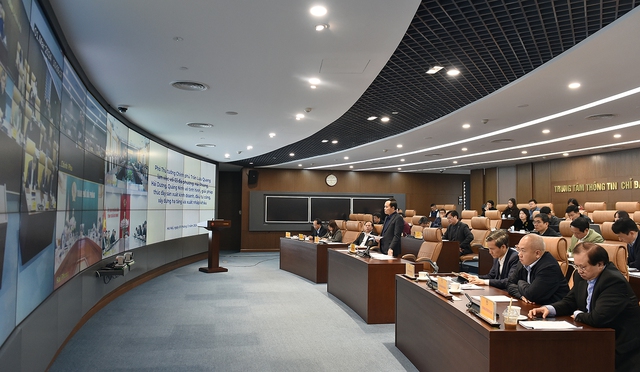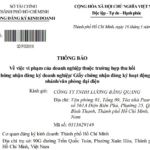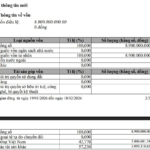
Deputy Prime Minister Tran Luu Quang chaired an online working session with Hai Phong, Quang Ninh, and Hai Duong to address difficulties, promote production and business, public investment, infrastructure construction, and exports in these localities – Photo: VGP / Hai Minh
On the morning of March 1st, Deputy Prime Minister Tran Luu Quang chaired an online working session with Hai Phong, Quang Ninh, and Hai Duong to address difficulties, promote production and business, public investment, infrastructure construction, and exports in these localities.
This is the third meeting of Deputy Prime Minister Tran Luu Quang with Hai Phong, Quang Ninh, and Hai Duong on these issues after the Prime Minister issued a decision to establish 26 working groups led by government members to work with 63 provinces and cities nationwide.
During the meeting, the localities reported on the production and business situation, public investment, infrastructure construction, and exports in 2023 and the first two months of 2024. They also mentioned the difficulties that need to be resolved.
In particular, Quang Ninh province reflected the management of imported photocopy machines and gas masks, which are currently under the control of multiple agencies. They proposed that each item should only go through the import/export licensing process with a single focal agency to reduce time and costs for businesses.
Quang Ninh province also requested the Ministry of Education and Training to issue guidelines on determining the number of employees in educational institutions, public career units as the basis for the University of Ha Long to develop a self-reliance project for provincial People’s Committee approval.
Hai Phong city proposed that the Ministry of Natural Resources and Environment promptly decide on the administrative boundary management at sea between Hai Phong and Quang Ninh provinces. They also requested the Ministry of Planning and Investment to report to the Prime Minister for approval of the investment policy for industrial parks and 4 port projects under the Lach Huyen International Gateway Port.
Hai Duong province recommended that the ministries and sectors provide advice to the government on regulations on the procedures for terminating projects in cases where projects are not implemented or progress slowly without permission from the competent state authority to adjust the progress.
Hai Duong province also proposed the need for guidelines to resolve difficulties and issues related to the basis and method of calculating costs in the total investment amount of procurement of medical equipment, steps for the competent authority to decide on the project’s design option in procurement of equipment.
Representatives of the ministries of Planning and Investment, Industry and Trade, Finance, Natural Resources and Environment, Culture, Sports and Tourism, and Transport responded to the recommendations of the localities. They also updated the progress of resolving difficulties and issues within their respective jurisdiction, as well as informed about new regulations of the central government.
Speaking at the meeting, Deputy Prime Minister Tran Luu Quang emphasized that the Prime Minister assigned government members to meet with localities to help the government and the Prime Minister promptly understand and handle the difficulties and issues at the grassroots level.
Deputy Prime Minister stressed that since this mechanism was established, many new mechanisms have been built and are about to take effect, the most significant change being a strong focus on removing obstacles and enhancing the right to self-determination and responsibility at the grassroots level, based on reflections and recommendations from localities.
For the three localities, based on the previous two meetings, about half of the issues have been resolved by the ministries and sectors. The remaining issues will continue to be addressed in the time to come through new laws, decrees, and circulars.

Deputy Prime Minister requests ministries and agencies to continue “repaying” the suggestions of localities at previous meetings – Photo: VGP / Hai Minh
To make this working mechanism more effective, Deputy Prime Minister requested the localities to discuss their specific difficulties and issues with the relevant ministries and agencies and actively follow up on responses from the central agencies.
“More importantly, I want the local comrades to propose how the central agencies should handle the issues because they are the ones who know what is right,” Deputy Prime Minister emphasized.
In addition to the state management responsibility of the Ministry of Culture, Sports and Tourism, Quang Ninh can propose to the Ministry how to adjust the buffer zone area of the Ha Long Bay World Heritage Site in the most reasonable and harmonious way with the set targets, Deputy Prime Minister gave an example.
Deputy Prime Minister also requested that the localities closely follow the central government’s institutional construction work, avoiding situations where the central documents are issued but the local comrades are not aware of or promptly updated or there are actions that have been processed but the localities still have questions.
Deputy Prime Minister highly appreciated the efforts of the Ministry of Natural Resources and Environment and the Ministry of Construction in their efforts to complete the drafting of guiding decrees for the implementation of the amended Land Law and Housing Law, aiming to put these two laws into practice soon. He suggested that the localities thoroughly study and provide comments on the drafts of the decrees (especially the Land Law with 9 decrees to be issued) as this is a once-in-ten-year opportunity to remove difficulties and obstacles for the localities.
For the ministries and sectors, Deputy Prime Minister requested that they continue to “repay” the suggestions of the localities at the previous two meetings; fully acknowledge the opinions at today’s meeting, specifically, discuss them with the localities before answering in order of priority and the more specific, the better.
Deputy Prime Minister insisted that from now on, it is necessary to compile statistics on which difficulties and obstacles have been resolved by the localities, rather than just statistics on which ministries and agencies have sent response documents to the localities, because this working mechanism was established to remove difficulties and obstacles for the localities and to avoid negative situations such as corruption, waste, etc., which would make the localities unsure how to proceed.












